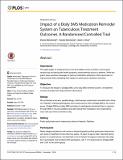Impact of a Daily SMS Medication Reminder System on Tuberculosis Treatment Outcomes: A Randomized Controlled Trial
Author(s)
Mohammed, Shama; Glennerster, Rachel; Khan, Aamir J.
DownloadMohammed-2016-Impact of a Daily SMS Medication.pdf (1.598Mb)
PUBLISHER_CC
Publisher with Creative Commons License
Creative Commons Attribution
Terms of use
Metadata
Show full item recordAbstract
Importance
The rapid uptake of mobile phones in low and middle-income countries over the past decade has provided public health programs unprecedented access to patients. While programs have used text messages to improve medication adherence, there have been no high-powered trials evaluating their impact on tuberculosis treatment outcomes.
Objective
To measure the impact of Zindagi SMS, a two-way SMS reminder system, on treatment success of people with drug-sensitive tuberculosis.
Design
We conducted a two-arm, parallel design, effectiveness randomized controlled trial in Karachi, Pakistan. Individual participants were randomized to either Zindagi SMS or the control group. Zindagi SMS sent daily SMS reminders to participants and asked them to respond through SMS or missed (unbilled) calls after taking their medication. Non-respondents were sent up to three reminders a day.
Setting
Public and private sector tuberculosis clinics in Karachi, Pakistan.
Participants
Newly-diagnosed patients with smear or bacteriologically positive pulmonary tuberculosis who were on treatment for less than two weeks; 15 years of age or older; reported having access to a mobile phone; and intended to live in Karachi throughout treatment were eligible to participate. We enrolled 2,207 participants, with 1,110 randomized to Zindagi SMS and 1,097 to the control group.
Main Outcome
The primary outcome was clinically recorded treatment success based upon intention-to-treat.
Results
We found no significant difference between the Zindagi SMS or control groups for treatment success (719 or 83% vs. 903 or 83%, respectively, p = 0·782). There was no significant program effect on self-reported medication adherence reported during unannounced visits during treatment.
Conclusion
In this large-scale randomized controlled effectiveness trial of SMS medication reminders for tuberculosis treatment, we found no significant impact.
Trial Registration
The trial was registered with ClinicalTrials.gov, NCT01690754.
Date issued
2016-11Department
Massachusetts Institute of Technology. Department of Economics; Abdul Latif Jameel Poverty Action Lab (Massachusetts Institute of Technology)Journal
PLOS ONE
Publisher
Public Library of Science
Citation
Mohammed, Shama; Glennerster, Rachel and Khan, Aamir J. “Impact of a Daily SMS Medication Reminder System on Tuberculosis Treatment Outcomes: A Randomized Controlled Trial.” Edited by Lei Gao. PLOS ONE 11, no. 11 (November 2016): e0162944 © 2016 Mohammed et al
Version: Final published version
ISSN
1932-6203